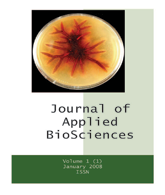Journal of Applied Biosciences (J. Appl. Biosci.) [ISSN 1997 - 5902]
Volume 35: 2244 - 2250. Published November 8, 2010.
Status of contamination and antibiotic resistance of bacteria from well water in Ago- Iwoye, Nigeria
Moses.O. Efuntoye* and Mopelola O. Apanpa
1Department of Microbiology, Olabisi Onabanjo University, P.M.B. 2002, Ago-Iwoye, Nigeria.
* Corresponding author E-mail: [email protected]
ABSTRACT
Objective: In developing nations, majority of people depend on untreated surface and shallow groundwater that is subject to contamination from different sources. A cross-sectional study was conducted on wells that supply water for domestic uses in Ago-Iwoye, Nigeria to determine their microbiological quality.
Methodology and results: A total of 200 samples of water were collected from 50 wells over a period of three months. The samples were analyzed for total coliforms, faecal coliforms, faecal streptococci and heterotrophic bacterial count. The predominant bacteria recovered were screened for susceptibility to various antibiotics which are commonly used in the community. The total coliform counts in majority of the wells (86%) ranged from 1.2x 102 - 1.9 x 102 cfu/ml, which exceeded the WHO standard of 10/100ml for drinking water. In addition all the samples had faecal coliform count ranging from 65-91 per ml which is above the WHO guideline of less than 1/100ml. The calculated faecal coliform/faecal streptococci (FC/FS) ratio revealed that contamination was essentially of human faecal origin. The organisms isolated belonged to seven genera, i.e. Escherichia, Klebsiella, Pseudomonas, Bacillus, Proteus, Staphylococcus and Alcaligenes. The predominant species was Escherichia coli. Higher level of resistance to the antibiotics tested was more prominent in E. coli than in Klebsiella spp. and Staphylococcus aureus.
Conclusions and application of findings: Although the susceptibility of the strains of organisms encountered to some commonly used antibiotics was high, those that were resistant to some antibiotics pose a serious public health risk especially with the increasing rate of transfer of resistant genes from one bacterium to another. There is therefore need to treat water obtained from wells in the community to make it safe for domestic use.
Key words: Bacterial contamination, well water, antibiotic resistance
FULL PAPER [PDF AVAILABLE HERE]
